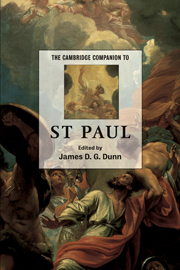Book contents
- Frontmatter
- Introduction
- Part I Paul’s life and work
- Part II Paul’s letters
- 3 1 and 2 Thessalonians
- 4 Galatians
- 5 1 and 2 Corinthians
- 6 Romans
- 7 Philippians
- 8 Colossians and Philemon
- 9 Ephesians
- 10 The Pastoral Epistles
- Part III Paul’s theology
- Part IV St Paul
- Select bibliography
- Index of References
- General Index
9 - Ephesians
from Part II - Paul’s letters
Published online by Cambridge University Press: 28 May 2006
- Frontmatter
- Introduction
- Part I Paul’s life and work
- Part II Paul’s letters
- 3 1 and 2 Thessalonians
- 4 Galatians
- 5 1 and 2 Corinthians
- 6 Romans
- 7 Philippians
- 8 Colossians and Philemon
- 9 Ephesians
- 10 The Pastoral Epistles
- Part III Paul’s theology
- Part IV St Paul
- Select bibliography
- Index of References
- General Index
Summary
Among the major distinctives of Ephesians within the Pauline letter collection, there are two that make the most immediate impression. In terms of content, the concentrated attention it gives to the phenomenon of the church stands out, so that it is not at all surprising that this letter has been a key resource for theological reflection on the corporate nature of Christian existence. In terms of form, it is noticeable that discussion of the church appears in both halves of a document that does not have the usual Pauline letter body. Instead, between its letter opening (1:1, 2) and closing (6:21-4), Ephesians is divided into two lengthy parts – an expansion of the usual thanksgiving section that runs from 1:3 to 3:21, and an extended paraenesis or section of ethical exhortation that stretches from 4:1 to 6:20. In the former the letter's recipients are reminded of the privileges they enjoy as believers in Christ and members of the church and of their significant role in God's plan for the cosmos. In the latter they are summoned, in the light of their privileged status, to conduct their lives in an appropriate fashion in the church and in the world.
Ephesians is also distinctive as the most general of the Pauline letters. Since the usual strategy for interpreting Paul’s letters builds on the recognition that he carries out the pastoral application of his gospel in interaction with the particular circumstances and needs of his readers, Ephesians proves initially frustrating. It gives us extremely little information about its recipients or their specific circumstances.
- Type
- Chapter
- Information
- The Cambridge Companion to St Paul , pp. 133 - 140Publisher: Cambridge University PressPrint publication year: 2003
- 2
- Cited by



